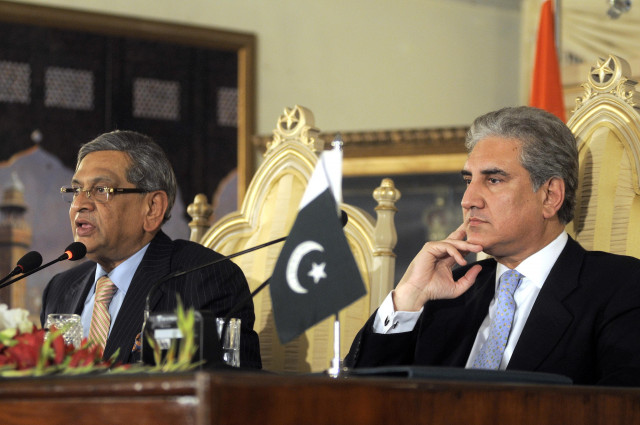Talks without normalisation
Both the mainstream parties are in favour of normalisation with India but the army and the ISI call the shots.

In Pakistan, interest in these talks has dwindled over time, perhaps, because everyone knows that Pakistan has stiffened its stance on talks in the post-Musharraf period and expressed this new toughness through Jamaatud Dawa, the global terrorist bugbear that Pakistan refuses to tame.
India and Pakistan’s foreign ministers’ scuffle last year was said to have been caused by Indian Minister for External Affairs SM Krishna’s insistence on the ‘piecemeal’ approach, while Foreign Minister Shah Mehmood wished to focus on what has come to be known as ‘composite dialogue’. The composite talks contained a number of ‘baskets’, some of them created after the issue of Kashmir as firewalls that Pakistan had to breach before getting to the ‘core’ of the India-Pakistan quarrel. Now, the issues being talked about are nine instead of the original five or so, indicating how, with the passage of time, disputes escalate and tighten the space for normalisation.
If the two ministers have a successful meeting and Jamaatud Dawa doesn’t queer the pitch again by launching another adventure, then the two governments will start talking of counter-terrorism, humanitarian issues, peace and security including CBMs, the Kashmir issue, Sir Creek, etc.
In India, the coalition government of Manmohan Singh is hamstrung by hostile public opinion and the media, although the prime minister himself is convinced that applying the ratchet of Mumbai to the talks would get India nowhere, especially when Mr Singh is thinking of regional economic ‘connectivity’ under Saarc to boost India’s status.
Pakistan can only benefit from his approach. Here, both the mainstream parties are in favour of normalisation with India as a way of ‘softening’ the tough stances adopted on the complex bilateral issues. But in this case, it is the Pakistan army and the ISI that call the shots and vet all documents to be signed. The test-firing by Pakistan of Hatf-7 cruise missile is a symbolic accompaniment to the news that the stalled talks are on again.
In the case of Siachen, the Indian army seems to have the upper hand in an otherwise civilian-dominated India. After Musharraf’s ham-handed adventure at Kargil the Indian public opinion, too, has hardened; and the recent unfortunate downturn in the Indo-China equation has not helped either. The Sir Creek affair is even more shocking and something no one outside the region can understand: both states have failed to meet the UN deadline for declaring their economic zones because of the Sir Creek dispute, but insist on arresting each other’s fishermen as a shameful bilateral pantomime.
Jamaatud Dawa has also added to the Kashmir dispute the question of river waters that India is presumably stealing under the Indus Water Treaty. As to why Jamaatud Dawa should raise the issue of waters in a mammoth rally in Lahore is incomprehensible. When Pakistan’s Indus Water Commissioner Jamaat Ali Shah declined to say that India was stealing Pakistan’s water, he was replaced after a record four terms at the job. Since Pakistan is going for international arbitration on the issue — it did not get much satisfaction out of an earlier resort to this on India’s Baglihar Dam issue — there will hardly be any discussion on it during the composite dialogue.
Pakistan says: Let there be resolution of disputes before normalisation. Since this process started a couple of decades ago, this approach has only worsened the state of disputes. Will it work this time? Most probably, it won’t.
Published in The Express Tribune, February 12th, 2011.















COMMENTS
Comments are moderated and generally will be posted if they are on-topic and not abusive.
For more information, please see our Comments FAQ